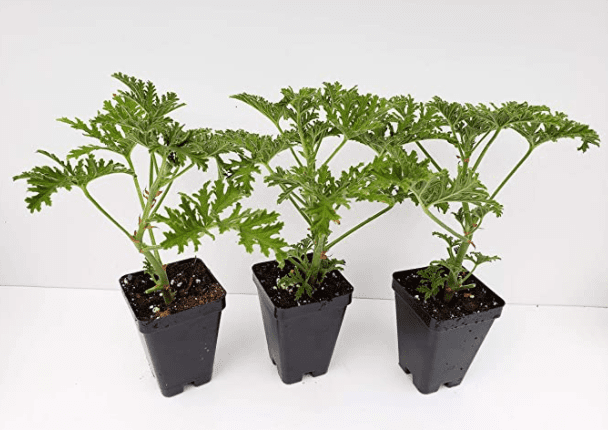Citronella Plant
It won’t take the bite out of a mosquito, but a whiff of this ugly citronella plant may tell the annoying insect to buzz off.
A geranium called citronella has been designed to ward off biting insects. It is being supplied from a nursery in northwest Orange County near Apopka.
Its marketers say that the leafy plant is genetically engineered to give off citronella oil, an ingredient found in some insect repellents.
“The plant works,” said Susan Griffith, co-owner of Griffith Greenhouses, growing and selling the citronella plants. “I put two of the plants on my back deck. Now I can sit out there, and my ankles don’t get chewed up.”
It’s not pretty, and it doesn’t flower. But more than 150,000 of the citronella plants have been sold in Europe and Canada over the past five years, said Gordon Horwitz, president of Austerica Inc. This Canadian company owns the North American rights to the citronella plant.
“The people who buy them are my best salespeople,” he said. “They come back for more.”
Now Horwitz is selling the plants in the United States. Horwitz said that developed by a Dutch horticulturist, citrosa is a cross between an African geranium and a plant called the Grass of China.
The citronella plant cannot reproduce, so nurseries must grow it from tissue cultures, he said. It proliferates in Florida and can reach a height of 5 feet, possibly more.
The citronella plant gives off a lemony smell, keeping mosquitoes and other biting insects up to 10 feet away, said Steve Griffith, co-owner of the greenhouses, with 125,000 citrosa on hand.
Horwitz said that the non-toxic plant could be placed on patios, planted in gardens, or taken on boats. “It’s a portable aerosol that works 365 days a year.”
Some, however, are not biting just yet.
Though used as an insect repellent for years, the citronella plant is not that effective at keeping mosquitoes away, said George Alexander, Orange County’s mosquito control director.
“I’d have to see it (the plant) in action to believe it,” Alexander said.
That won’t be too hard. Garden centers in Central Florida are selling the plants for $11.95 each, Steve Griffith said.
This month, the citronella plant is one of two tropical plants “introduced” at the Apopka Art and Foliage Festival.
“They’re not pretty, but they’re not ugly. They’re utilitarian,” Horwitz said of the citrosa. “I’m convinced they work.”
Other Opinion On Citronella Plant Effectiveness
The mosquito plant, sold under the Latin name pelargonium citrosum Van Leenii, is generally known as the citronella plant. It must be propagated by cuttings and is not available as seed.
The citrus’s distributors claim the plant is a scientifically engineered cross between the tropical lemongrass, from which citronella oil is produced, and an unspecified scented geranium. An elusive Dutch scientist, Dr. Dirk Van Leeni, is credited with making the cross, but garden writers have failed to track him down.
Skeptics, myself included, question whether such a complex transfer of genes is possible and feel the citrosa is just a scented geranium backed with an inventive publicity campaign. Such is the background of this controversial plant.
Whatever the truth of its ancestry, citrosa appears to be nothing more than a vigorous, not especially attractive, scented geranium.
There have also been reports that the citronella plants can only be propagated by experts using tissue culture techniques due to their exorbitant price. This is a load of rubbish. In my experience, cuttings root easily and grow like weeds.
I was given two small citronella plants in early spring, and by August, they had made substantial bushy plants. Standing on the perimeter of my patio, they seemed not to affect whatsoever the mosquito population.
Feeling I must give them a fair trial, I moved the planters and put one on either side of my favorite lounger.
I even crushed some of the foliage in my fingers to release the scent, hoping that would send off the pesky mosquitoes. Sad to tell, but the mosquitoes settled on my arm within inches of the so-called mosquito repelling plant and even appeared to enjoy the scented air as they dined on my blood.
Having grown the plants, I am inclined to think the whole thing was a sham to hoodwink an unsuspecting buying public. I certainly would not recommend buying a plant. Citrosa isn’t even very appealing as a scented geranium.
Final Word
As We can see, opinions are divided regarding the effectiveness of the Citronella Plant.
Buy a few of these plants and see for yourself if they work.



























